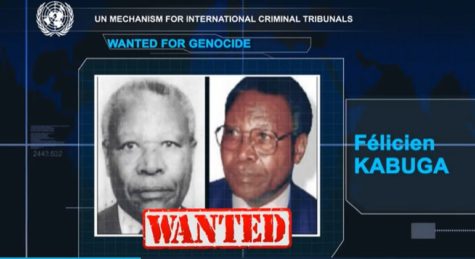
Credit: IRMCT Video via UN News Photo
French authorities have arrested Félicien Kabuga, long wanted by the International Criminal Tribunal for Rwanda (ICTR) for his alleged role in the 1994 genocide in Rwanda. [Guardian] Using his fortune and his radio station, Kabuga is accused of funding, logistically supporting, and inciting anti-Tutsi violence. [OHCHR Press Release; ACHPR Press Release] He was indicted by the ICTR in 1997 on genocide charges. [ACHPR Press Release] A French court will decide on May 27, 2020 whether his trial will be handled by the United Nations International Residual Mechanism for International Criminal Tribunals (IRMCT) – which is concluding the remaining work of the ICTR and its counterpart, the International Criminal Tribunal for the former Yugoslavia – or in France, where Kabuga is arguing he will receive a fair trial. [IJRC; NYTimes: Trial] The African Commission on Human and Peoples’ Rights (ACHPR) has called for the case to be transferred to Rwandan courts for trial, noting a “preference for national level prosecution” that meets the “needs of the affected people to participate in and witness the process.” [ACHPR Press Release] Kabuga’s arrest on May 16, 2020 is considered a highly significant development in international justice. [OHCHR Press Release; Just Security; NYTimes: Arrest] With his apprehension and the recently-confirmed death of Augustin Bizmana, just six fugitives indicted by the ICTR or IRMCT remain at large. See IJRC, ICTR.
Kabuga’s Indictment & Arrest
Félicien Kabuga was the president of the Comité Provisoire of the Rwandan National Defense Fund and of the Comité d’Initiative de la Radio Télévision Libre des Milles Collines (RTLM) radio station in the 1990s. He is now likely to face trial at the IRMCT for his role in using his authority at the RTLM to spread anti-Tutsi messages with the aim of promoting crimes against Tutsis in Rwanda from April to July 1994. See IRMCT, KABUGA, FÉLICIEN (MICT-13-38). Kabuga, one of the richest men in Africa at the time, is also alleged to have financed and assisted the interahamwe (a militant group) in the killing of Tutsis. See id.
He had evaded arrest since the ICTR indictment in 1997 and had been living under a false identity in France. It is believed that Kabuga has spent time Belgium, the Democratic Republic of Congo, Germany, Kenya, and Switzerland in the more than 20 years that he has been on the run. [Just Security; HRW: Arrest] At one point, the maximum reward for information on Kabuga was $5 million, offered by the United States in an effort to capture him in Kenya, where he was known to have hideouts as well as high-level connections. [NYTimes: Arrest] Human Rights Watch has noted that while “[q]uestions remain over how Kabuga was able to evade justice for over two decades…cooperation between governments has made it possible for victims and survivors at last to see him face trial….” [HRW: Arrest]
The ICTR prosecution charged Kabuga with direct and superior responsibility for genocide, complicity in genocide, direct and public incitement to commit genocide, attempt to commit genocide, conspiracy to commit genocide, and crimes against humanity for acts of persecution and extermination in 1997. [IJRC] Prior to closing its doors, the ICTR transferred the case to the IRMCT on August 1, 2012. [IJRC] Kabuga remains under French custody, and a French court will decide on Wednesday, May 27 whether he will be transferred to the IRMCT once the necessary legal proceedings are completed in France. [IRMCT Press Release; Reuters] Kabuga considers the IRMCT to be politically biased and is arguing to be tried in French court. [NYTimes: Trial; Reuters]
The IRMCT currently has jurisdiction over Kabuga’s case, as well as the case one other individual who remains at large: Protais Mpiranya. See IJRC, ICTR. The ICTR relinquished jurisdiction of five other fugitives (Fulgence Kayishema, Charles Sikubwabo, Aloys Ndimbati, Pheneas Munyarugarama, and Ryandikayo) to Rwandan authorities. See id.
ICTR Background & Legacy
The ICTR was established by the UN Security Council in November 1994 to prosecute those most responsible for genocide and other serious violations of international humanitarian law committed in Rwanda during the 1994 genocide, a civil war and ethnic cleansing of Tutsis and moderate Hutus by Hutu extremists. See UN Security Council, Resolution 995, UN Doc. S/RES/955 (1994), 8 November 1994, para. 1. Over the course of its 21 years of operation, the ICTR indicted 93 people, sentenced 61, acquitted 14, and heard over 3,000 witnesses’ testimony. See IJRC, ICTR. The ICTR shared responsibility for remedying the atrocities with domestic tribunals and 12,000 gacaca courts (informal justice mechanisms described as community courts), which completed their handling of at least one million cases related to the genocide in 2012. [Africa Research Institute; HRW: Arrest; BBC]
Additional Information
Visit IJRC’s Online Resource Hub for more information on internationalized criminal tribunals, the ICTR, Kabuga’s case, or to view our Table of Cases with a summary of each indictment and its outcome at the ICTR.
